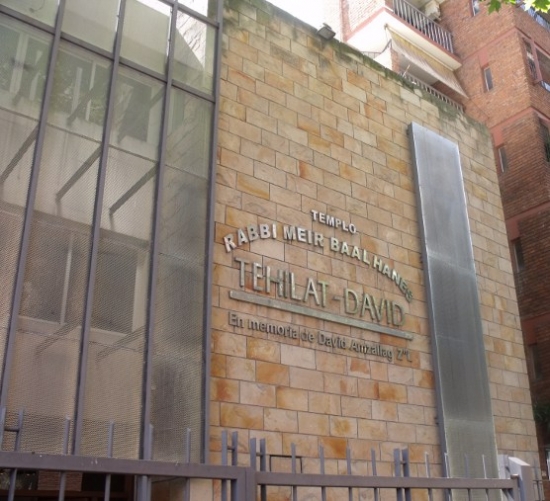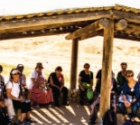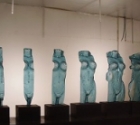
Perhaps it is the small size of this country and the existential threat from neighboring countries that caused us to identify so strongly with Uruguay, or perhaps it is the deep sense of Zionist commitment of the Jews living there.
Uruguay, although not a favorite tourist destination, has become a favorite place of ours since a recent vacation trip to South America.
Our trip included wonderful places: we loved walking through the expanse of parks and gracious tree-lined streets of Santiago, Chile and we were delighted by the antics of the small, saucy and curious Magellanic penguins in remote Otway Sound in Punta Arenas. We visited the Tierra del Fuego National Park at “the end of the world” in Ushuaia, Argentina, travelled to the southern end of the Panamerican Highway and stood at the “jump-off” point for those visiting Antarctica. We braved torrential rain and biting winds when we visited Stanley, capital of the Falkland Islands, and learned about the life of the nearly 3,000 British citizens living there, and of the war that threatened their existence.
These were new and exciting sites for us, but the place we remember most fondly was Uruguay and its capital city, Montevideo. This tiny country, located between two giant neighbors, Argentina and Brazil, has a population of 3.3 million people, half of whom live in Montevideo, a charming capital city with elegant 19th century buildings, beautiful parks and historical monuments.
Uruguay is one of South America’s most stable and democratic nations with a tradition of humanism and social justice. Education from age four through to university is free and every child in primary school has a computer. It is planned that secondary-school children will also have computers, as many of these children come from impoverished backgrounds and this is one way that the government will attempt to reduce the educational gap.
An article from Globes which appeared in The Jerusalem Post (August 28, 2011), “Feisty Uruguay wins Respect from Neighbors, Investors” describes the country as a “plucky little country led by a former guerrilla leader” and lauds the country for its stable institutions, low level of corruption, and respect for the rule of law. Although Uruguay has been adversely affected by the worldwide financial crises, Globes cites its recent credit-rating upgrades and its voluntary debt renegotiation as an example to other crisis-struck countries.
But these facets of life in Uruguay were not what touched our hearts. We were interested in learning about the local Jewish population, and Graciela, our delightful and knowledgeable Jewish guide in Montevideo, introduced us to Jewish life in Uruguay. She began by telling us about her father, who came to Uruguay in 1917, because it was one of the few countries which welcomed Jews and did not demand that new immigrants be sponsored by someone willing to provide financial support for them.
According to Graciela, there are presently some 20,000 - 25,000 Jews in Uruguay and they have well-organized social and cultural lives. We visited several of the 20 synagogues in Montevideo, most of which are Orthodox and serve both Ashkenazi and Sephardi congregants, sometimes in joint services. Only six, however, hold services on Friday evenings, Saturday mornings and on Rosh Hashana and Yom Kippur. The remaining synagogues are used for celebrations and one serves as the center for coordinating aid to the Jewish community: old-age and medical assistance and programs for the handicapped. Montevideo also has a kosher hotel, a kosher butcher shop, and two Jewish day-schools (down from three because of the financial crisis and the many children on scholarships). There are eight Zionist youth movements and a representative from the Jewish Agency.
The Jewish community is largely secular but very Zionistic. Among South American countries, Uruguay has the largest percentage of Jews per capita, who have made aliyah to Israel. It was the fourth country to officially recognize Israel and the first to receive an ambassador from Israel, Yitzhak Navon. On driving through the city we passed Golda Meir Square, a monument to Albert Einstein and the Israeli Embassy with flag flying.
Uruguay is also the only country in South America that has an official national memorial to the victims of the Holocaust, set on the shore of one of the most beautiful public beaches in the city. It is surrounded by a lovely park and is open to the public, including periodic visits by groups of the city’s school-children.
Although nominally a Catholic country, Uruguay’s population is largely secular. Christmas day is called “Family Day” and there is a float in the annual Carnival commemorating the original Jewish peddlers who came to Uruguay and knocked on doors, selling their wares for “easy installment payments”.
However, in spite of the liberal and supportive people and government and the untiring efforts at creating a vibrant Jewish community, the Jewish population of Uruguay faces serious challenges. There is a high rate of assimilation and intermarriage and there have been defacements and terrorist bombings of Jewish buildings, especially during times of financial crises.
Perhaps it is the small size of this country and the existential threat from neighboring countries that caused us to identify so strongly with Uruguay, or perhaps it is the deep sense of Zionist commitment of the Jews living there. Or perhaps it is the memory of Graciela’s stories, told in Hebrew, English and Spanish that touched our Jewish souls, reminding us of life in Israel and leaving us with warm and deep feelings for this admirable little country.


 ESRA College Netanya is reborn
ESRA College Netanya is reborn ESRA HERZLIYA ACTIVITIES
ESRA HERZLIYA ACTIVITIES Chanukah Celebration at ESRA Rishon LeZion
Chanukah Celebration at ESRA Rishon LeZion  From Bible to Bedouins and Battles
From Bible to Bedouins and Battles Trip to the Dead Sea
Trip to the Dead Sea Japan
Japan Deborah (Debby) Lieberman
Deborah (Debby) Lieberman